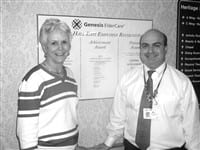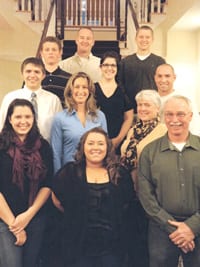Climbing A New Ladder Heritage Hall Program Targets Nurse Education — And Retention
The nursing crunch may not be making the headlines it did when it first surfaced, but the problem persists in health care facilities across Massachusetts and the entire country.
The situation is no different in the nursing home industry, where facilities are struggling to hire and retain the nursing staffs they need to provide sufficient — and consistent — care to their residents.
That’s why administrators at Genesis Eldercare’s Heritage Hall nursing home complex in Agawam are pleased with the early results of a state grant initiative implemented last fall.
The educational program known as “Campus on Campus,” they claim, has not only helped the five-building complex increase its staff of nurses and certified nurses’ aides (CNAs) and cut the costs of overtime and outside help, but it has fostered a sense of self-esteem among the staff that makes it easier to retain employees once they arrive.
“We wanted to provide educational programs to our staff and to create a career ladder for employees in other departments to become CNAs and for CNAs to go back to school to become LPNs or RNs,” said Ira Schoenberger, administrator of Heritage Hall East, who wrote the grant request.
“We thought, wouldn’t it be great to offer our employees college-level classes right here on campus and allow them during their own time to further their personal growth?”
As he explained to The Healthcare News, workers who feel valued and can see a viable career path taking shape in front of them are more likely to stay on board, leading to better care for patients and cost savings for Heritage Hall itself — a win-win-win situation, to be sure.
Seeing an Opportunity
Movement toward an educational program in partnership with local colleges began early in 2001, when Schoenberger applied for a grant from the Commonwealth’s Extended Care Career Ladder Initiative (ECCLI). That program helps nursing homes provide career ladder development and training for their workers.
Heritage Hall East was awarded an ECCLI grant for an employee development program that features, at its core, partnerships with Springfield Technical Community College and Holyoke Community College to offer a variety of courses on the Heritage Hall campus. Those courses range from English as a second language and GED preparation to college-level academic offerings, but employees may also gain training to become CNAs or nurses.
“By offering these programs, we can hopefully end up filling the needs we have in the areas of licensed staff and CNAs,” Schoenberger said.
The early results have been decidedly positive, said Barbara Corrigan, a nurse and geriatric clinical specialist who directs the Campus on Campus effort, and since last fall, the program has been offered to staff across all five buildings of the complex.
Corrigan provides support and counseling to the staff to help them develop a plan for their continuing education. The ultimate goal, she said, is to remove as many barriers as possible to furthering employees’ education.
The numbers speak for themselves. Since the program was instituted, retention and turnover costs at Heritage Hall — including recruiting expenses, overtime pay, and staffing agency expenses for temporary help – have been cut in half, and those agency fees by themselves have been reduced by 75{06cf2b9696b159f874511d23dbc893eb1ac83014175ed30550cfff22781411e5}.
“We’ve seen quite a reduction in overtime and employee turnover just from being able to value our employees through this educational program,” Schoenberger said.
Part of that shift has come from some former per-diem employees, who had worked only one or two days per week, joining the full-time staff in order to gain the benefit of the education program.
Whatever the reason, Corrigan said, the cost of relying too heavily on per-diem and agency help is not only financial in nature; quality of care can also suffer. “They may be qualified for what they’re doing, but they’re not really comfortable caring for our residents,” she insisted. “It’s better to have your own permanent employees.”
Culture Change
In addition, the state’s WorkSource Staffing Partnership is offering workshops to Heritage Hall staff on topics ranging from communication and stress management to domestic violence, conflict resolution, and debt management.
“These things have changed the culture here at Heritage Hall so that the staff members are feeling better about themselves, have better self-esteem, and therefore are giving better care because they’re more positive about things,” Corrigan said.
Employees are indeed latching onto the spirit of the program, as evidenced by 40 staff members who have completed courses so far, with some of them having finished multiple classes.
“When you come here, you’re amazed at seeing the staff sitting in the break room studying together,” she said. “We’ve brought employees together from all five buildings because they’re taking the same classes, studying and learning together. It has become part of the culture, so for a small amount of money, we’ve been able to impact five facilities on our campus.”
Schoenberger said a recognition event will be slated in June for employees who have participated in the programs. Meanwhile, Heritage Hall has applied for an extension of the grant for another year
“There is such a need for nurses,” he said. “Here, we’re grooming our own staff to have the career skills necessary to take on other positions around the campus.”
Corrigan said her role as program director marks the first time her health-care role has not involved direct patient care. But the transition is worth it, she claimed, since she realizes that quality patient care begins with a dedicated staff, and the grant program is designed to build just that.
“From my perspective, it has a very strong impact on patient care in terms of reducing the nursing shortage, which is really disastrous at this point,” she said. “I can see how it’s a daily struggle to get able bodies to care for people.”
Heritage Hall, on the other hand, wants to go back to a less stressed time for nurses and aides — by going back to school.



